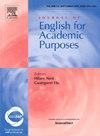GPT作为书评人:GPT生成的与学者撰写的学术书评的移动和句法复杂性分析
IF 3.4
1区 文学
Q1 EDUCATION & EDUCATIONAL RESEARCH
引用次数: 0
摘要
本研究通过移动分析和句法复杂性评估,探讨了gpt生成的学术书评与学者撰写的学术书评的修辞和句法特征。根据Swales的体裁分析框架,我们比较了50篇来自ssci索引期刊的人工撰写的评论和100篇使用两种提示策略生成的ggt生成的评论。我们的分析揭示了三个主要发现:修辞策略的系统性差异,不同修辞动作的句法策略根本不同,以及对GPT的修辞可及性的明确层次。人类审稿人倾向于根据上下文定制他们的方法,并有选择地使用修辞步骤,而GPT应用更详尽和潜在的公式化策略。此外,人类撰写的评审采用更高层次的从属关系来创建思想之间的层次关系,而gpt生成的评审通过增加名义上的细化和协调来实现复杂性。此外,GPT展示了标准化结构动作(内容描述和结束评估)的熟练程度,但在学科情境化方面面临重大挑战。这些模式表明,虽然GPT可以有效地复制学术体裁的正式方面,但它缺乏人类专业写作所特有的修辞判断和学科洞察力。我们的研究结果通过揭示修辞动作如何在学术写作环境中沿着技术可及性和人工智能-人类协作的范围存在,有助于对体裁分析的理论理解。本文章由计算机程序翻译,如有差异,请以英文原文为准。
GPT as book reviewer: A move and syntactic complexity analysis of GPT-generated versus scholar-written academic book reviews
This study investigates the rhetorical and syntactic features of GPT-generated versus scholar-written academic book reviews through move analysis and syntactic complexity assessment. Drawing on Swales’ genre analysis framework, we compare 50 human-authored reviews from SSCI-indexed journals with 100 GPT-generated reviews produced using two prompting strategies. Our analysis reveals three key findings: a systematic divergence in rhetorical strategy, fundamentally different syntactic strategies across rhetorical moves, and a clear hierarchy of rhetorical accessibility to GPT. Human reviewers tend to tailor their approach to the context and employ rhetorical steps selectively, whereas GPT applies a more exhaustive and potentially formulaic strategy. In addition, human-authored reviews employ higher levels of subordination to create hierarchical relationships between ideas, while GPT-generated reviews achieve complexity through increased nominal elaboration and coordination. Furthermore, GPT demonstrates proficiency in standardized structural moves (content description and closing evaluation), but faces significant challenges with disciplinary contextualization. These patterns suggest that while GPT can effectively replicate formal aspects of academic genres, it lacks the rhetorical judgment and disciplinary insight that characterize expert human writing. Our findings contribute to theoretical understandings of genre analysis by revealing how rhetorical moves exist along a spectrum of technological accessibility and implications for AI-human collaboration in academic writing contexts.
求助全文
通过发布文献求助,成功后即可免费获取论文全文。
去求助
来源期刊

Journal of English for Academic Purposes
Multiple-
CiteScore
6.60
自引率
13.30%
发文量
81
审稿时长
57 days
期刊介绍:
The Journal of English for Academic Purposes provides a forum for the dissemination of information and views which enables practitioners of and researchers in EAP to keep current with developments in their field and to contribute to its continued updating. JEAP publishes articles, book reviews, conference reports, and academic exchanges in the linguistic, sociolinguistic and psycholinguistic description of English as it occurs in the contexts of academic study and scholarly exchange itself.
 求助内容:
求助内容: 应助结果提醒方式:
应助结果提醒方式:


